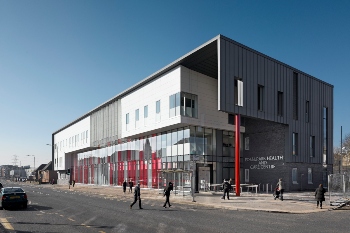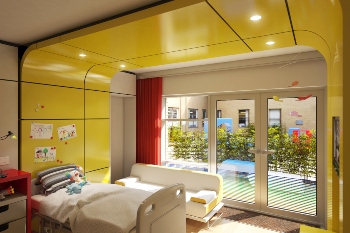Covid-19 has shone a spotlight on the ongoing pressures that the healthcare sector faces. And, at the same time, lockdown has raised new challenges across multiple sectors like manufacturing and retail – from keeping key workers safe to maintaining sales as people remain at home.
As these challenges have come to the fore, so too has a range of behavioural changes affecting the way society operates. While this of course isn’t limited to the way people use buildings, the built environment has perhaps witnessed one of the most fundamental adjustments we’ll see in our lifetimes.
For the retail sector, questions were already being raised around bricks and mortar stores and the role of the high street as consumers continue to buy products online. Lockdown has brought additional pressure for many non-essential retail spaces. Meanwhile transport and infrastructure requirements in the short term have been limited as people reduce their commutes. And, offices are empty with people working from home. These are fundamental changes to the way property has been used for decades – and they’ve all happened at once.
Some of the new ways of operating are only temporary changes to maintain social distancing. However, many of these new behavioural changes are set to have a lasting legacy beyond Covid-19. For instance, once this is over, will we see a push by more retailers for an online-only offering? Will we continue to see the ongoing transformation from retail to leisure amenities as a result? Will it mean that office workers work remotely more days during the week and return to offices simply as part of social interaction with their colleagues? If so, how does this impact infrastructure spending on transport?
While many questions remain hypothetical at this stage, one thing that is very clear is the increased focus people are now placing on their own health. Covid-19 has changed perspectives and now more than ever health and wellbeing are front-of-mind for people. Demand on healthcare could change significantly as this increased focus on our own health continues long past coronavirus. If so, this will create a new impetus to revise healthcare estates and build a health infrastructure that can support new demands.
 Why healthcare in towns could solve this issue
Why healthcare in towns could solve this issue
The retail and offices sectors represent a significant portion of how properties are used in towns and cities across the UK. Whereas, healthcare has a limited presence in town centres in many areas across the country.
And, with large hospitals facing huge pressures as a result of Covid-19, now more than ever there’s a need to reframe healthcare infrastructure to allow people to access primary services close to home.
This supports the wider government agenda of helping us all live long and healthy lives by reducing things like obesity rates. At the same time, returning to a community-focused healthcare infrastructure, could reduce pressure on acute care and encourage people to be more open and willing to visit clinics.
Right now, the property sector faces a paradigm shift. However, for local authorities, it provides a new opportunity to fundamentally review how buildings are used to increase the proportion of healthcare spaces in their towns. Not only that, it creates further impetus to ensure wellbeing is built into the fabric of how towns are designed in the long-term.
Through an increased presence of primary care within mixed-use schemes, and civic hubs that encourage wellness, the built environment can achieve and promote healthy living within society.
Rapidly evolving
To deliver an evolved healthcare estate, however, there will be a need to review the delivery model of healthcare buildings. The property sector doesn’t have the capacity to deliver such significant plans at speed in its current form. The sector will need to seriously look at modern methods of construction (MMC) for the solution.
The benefits of off-site construction have been well documented. Building elements can be designed and constructed through a manufacturing assembly line, which improves efficiency, scalability and speed of delivery. It also avoids issues like bad weather having a large impact on project timelines. There have been claims that MMC can manufacture a single ward in 16 weeks, with individual operating theatres available in just 10 as a result of MMC’s enhanced efficiency. Crucially it can also limit time on crowded sites – helping workers to maintain social distancing.
But MMC is not without its own challenges. It has taken decades for modular construction to shake off its post-war prefabrication image. If MMC is to work again, we need to ensure new healthcare environments are high-quality and that resulting spaces support sustainable areas that towns and cities will be proud of in years to come.
Architects having a role early on in the process will be key to this. Our role ensures that a strong sense of space can be delivered as part of schemes and that modular schemes are designed with quality in mind, not just efficiency. Crucially, our role also can see us managing relationships between manufacturers and the wider construction supply chain. Without this, any efficiency gains can be marginal as coordination is crucial to ensuring MMC projects run smoothly. And, as the broader sustainability agenda continues, our role will be increasingly focused on ensuring MMC delivers schemes that are net-zero carbon.
 A health-conscious built environment
A health-conscious built environment
Covid-19 has forced the healthcare sector to move rapidly and explore ways to meet this unprecedented challenge. While creating military style field hospitals in converted conference facilities, and even repurposing the manufacturing base is headline grabbing, these impressive undertakings have not in fact proved to be an effective response, as hospitals managed their ICU capacity through postponement of elective care.
We need to take the energy and imagination of the nightingale initiative and apply this within the revitalised care settings to create and even more flexible health estate, one that is better able to cope with spikes in demand, without jeopardising the care of existing patients. In order to undertake this futureproofing of healthcare estates, significant infrastructure spending plans will be required.
It seems highly likely that health environments will become the core driver for new development activity in the future. If local authorities, architects and the wider construction supply chain can deliver a coordinated approach to MMC, we’ll be able to provide a host of new health amenities to communities at pace, while ensuring these buildings are used long into the future.
Gareth Banks is regional director at architect AHR












